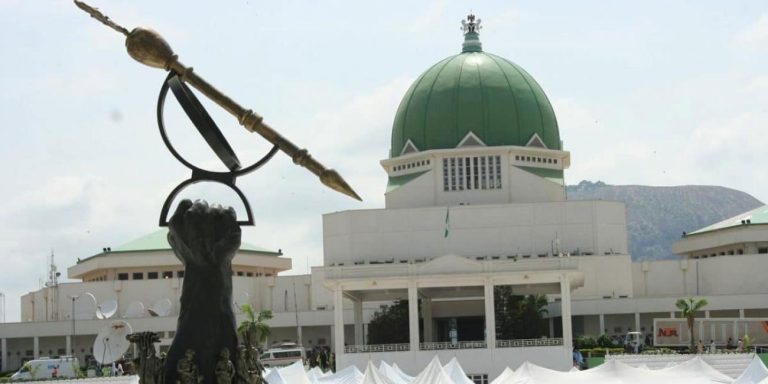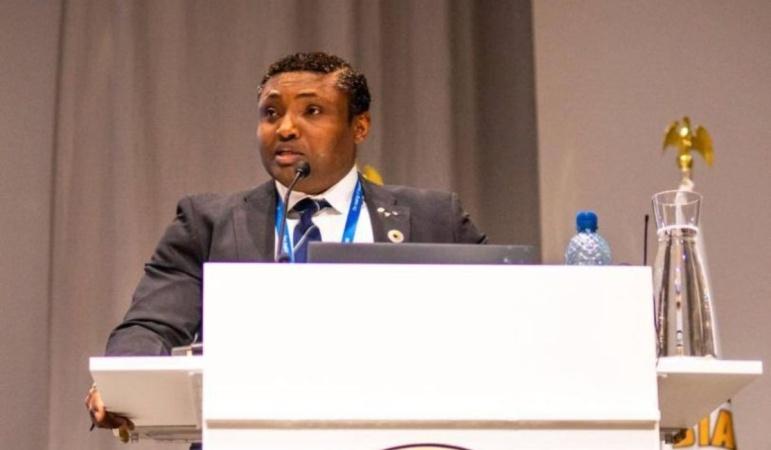- Tinubu not behind attack on Ajaero, escalating strike nationwide unreasonable – AGF office
- Lagos, Rivers, Kwara, Bauchi workers shun Labour, Kano, Edo, Delta, A’Ibom, others comply
The Federal Government on Tuesday berated the organised Labour over the ongoing nationwide strike declared by union leaders following the assault on the Nigeria Labour Congress President, Joe Ajaero.
Kamarudeen Ogundele, the Special Assistant to the Minister of the Justice and the Attorney-General of the Federation, in an interview on Arise Television on Tuesday, said the strike was not in the interest of the country.
But President of the Trade Union Congress, Festus Osifo who also appeared on Arise Television, noted that the Governor of Imo state, Hope Uzodimma, had not apologised over the brutalisation of Ajaero.
He said this as nationwide strike declared by the organised Labour recorded partial compliance in several states on Tuesday.
Faulting the Labour leaders, Ogundele said, “Declaring a strike at this time will not be in the interest of the country. The country is trying to regain economic control and to also recover in several sectors. Instead of looking for at how we progress as a nation, there is no need for us to try to be involved in actions that will constitute a clog in the process of the country.”
When asked if the FG had not talked to the labour unions before it got to this stage of protest, Ogundele said who spoke on what he described as the genesis of the strike, said, “They (the labour unions) claimed that the NLC president was attacked in Imo State and I understand that there was an order of the court banning them from assembling or protesting in Imo. But they went against the order of the court by assembling. The government of the day is not out to promote violence but the labour unions have not come out to say the president of the country had a hand in what happened on that day. Why are they now trying to escalate what happened in the state to the whole federation?”
Justifying the strike, Osifo stated, “We allowed some of the essential services workers to work because we are also patriotic people at the end of the day. From our assessment, the strike has been successful based on our template and if the government continuously foot drags, more institutions will be shut down.
On the court order stopping the strike, Osifo said, “The government can not continually take black market injunctions to cripple Labour. They will have to arrest the entire Nigerians.”
But there was partial compliance to the strike. While workers in Lagos, Rivers, Kwara, Bauchi, Zamfara, and several other states completely shunned the strike as offices, schools, and banks opened, there was partial compliance in some states where some sectors partly obeyed the strike directive.
Partial observance was recorded in Anambra, Ondo, Kaduna, Borno, and Ogun states as banks and overnment offices were open in some of them while workers did not report at work in others.
The strike was declared by the NLC and the TUC to protest the alleged brutalisation of the NLC president, during a workers‘ protest in Owerri, Imo State, on November 1.
Banks, government and private-owned schools, and tertiary institutions across Lagos did not obey the strike directive.
Also, business owners and parastatals carried on with their activities throughout Tuesday.
Some schools in Lagos, including Omole Grammar School, Olusosun Primary Health Centre, Oregun, and Ifako-Ijaiye General Hospital, were open for services.
Banks in the Oregun, Ikeja axis also opened their doors to customers.
However, students at the University of Lagos, Akoka, were sent away from their classrooms.
A student in the Department of Social Work, who gave his name simply as Emeka, said, “We came for a lecture at 9am but till 11am, we didn’t see our lecturer so we went back to our hostels while those leaving
off-campus went back home after we were told there was a strike.”
The Lagos State University, Ojo, did not participate in the strike as it went on with its ongoing examinations.
Students were seen reading and moving in and out of halls to sit for their exams.
A visit to the National Agency for Food and Drug Administration and Control office in the Oshodi area of the state also revealed that workers went about with their daily activities.
Public and private schools in Lagos state were open for regular school activities with no sign of strike observed.
Some teachers, who spoke to our correspondent, said they were aware of the directive by the NLC but had no reason to comply.
A teacher at a technical school, who spoke on the condition of anonymity, said, “We have a full house here. All our teachers are
working, and all our students are here. We heard about the strike, but, as you can see, we are not on strike.”
It was also observed that some workers at the Lagos State Secretariat, Alausa, were at their duty posts, while some offices only had a handful of staffers hanging around their offices when our correspondent visited.
The Public Relations Officer of the Lagos State chapter of the NLC, Mr Ismail Adejumo, said the level of compliance would increase on Wednesday (today).
“We have a substantial level of compliance today (Tuesday). Most of our affiliates have complied and we are mobilising others to join the struggle.
“Both the NLC and the TUC are in this struggle together.
We are currently moving around to monitor and enforce compliance among all our sister affiliates. We are determined to ensure that there is total compliance,’’ he stated.
Rivers workers
In Rivers State, the labour action recorded no compliance as schools, banks, and the state secretariat were open to the public.
Banks on the entire stretch of Aba Road and Azikiwe Road in Port Harcourt attended to customers.
State workers said they were aware of the nationwide strike but that they had yet to receive any directive from their unions in the state to join the industrial action.
Similarly, normal activities were observed at the Rivers State University Teaching Hospital where the staff attended to patients.
But the Nigerian Ports Authority’s entrance was barricaded by some union leaders who also prevented human and vehicular entry.
They used a MAC truck and several private cars to block the roundabout from the industry road axis of Port Harcourt all the way to the gate of Ports.
Following the development, some staff of the NPA were denied entry into the complex.
The state Chairman of the NLC, Alex Agwanwor, and his TUC counterpart, Okechukwu Onyefuru, had in a joint statement said they would comply fully with the strike directive.
In Kwara State, civil servants, including judicial workers, boycotted the strike as the ministries, departments, agencies, and courts operated in Ilorin, the state capital, throughout the day.
However, federal workers and bank officials did not report for work as their offices were under lock and key.
Commercial banks which opened to the public in the morning later shut their gates to customers following a directive from their union, while students who had earlier resumed classes were sent home by their teachers.
Most bank customers were left disappointed as the ATM machines were not dispensing cash.
Electricity consumers were not spared the pains of the strike as the Ibadan Electricity Distribution company locked its offices in Challenge and Baboko business centres.
The banner of the National Union of Electricity Employees was displayed at the gates of the business facility.
The security men informed the customers that the workers were on strike.
However, commercial transport operators in the state did not join the strike.
The NLC Chairman in the state, Saheed Olayinka, said that though some workers reported in their offices early in the day, they later left for their homes.
He said that a committee had been put in place by the NLC to monitor the strike, adding that members had been going around the offices to ensure that workers complied with the directive on the strike.
Bauchi schools
There was partial compliance in Bauchi State as some banks, schools, and filling stations opened for business in the metropolis.
The Fidelity Bank branch located close to Shagari Plaza opened to its customers but Taj, Access, and Eco banks located on Bank Road shut their gates.
A teacher at a government primary school disclosed that they were asked to send the pupils away and go home.
She said, “We opened our school today and we did our academic activities as usual but we got a circular from the Local Government Education Authority that we should close down. But because when the memo came we had a few minutes to close and the pupils were to write a test, so I just gave them the test and we closed.”
The Chairman of the Academic Staff Union of Universities, Abubakar Tafawa Balewa University, Bauchi, Ibrahim Inuwa, said that their members complied with the directives.
In Makurdi, Benue State, banks, schools, and the state secretariat were made to shut their gates as labour leaders in the state enforced the strike directive.
Primary and post-primary school pupils who were on their way to school were sent back and banks were forced to close.
Leaders of the NLC and TUC, Terungwa Igbe and Gideon Akaa, respectively described the level of compliance as ‘substantial.’
Some civil servants protested the action of the labour leaders and described it as ‘selfish.’
A worker, who simply identified himself as Amenger said, “I don’t know what has become of labour these days; because Ajaero was manhandled in Imo, all Nigerians must suffer.
“What did Ajaero do concerning those people recruited by (ex-governor Samuel) Ortom who were laid off by (Governor Hyacinth) Alia? Or what did he do when workers in Benue were not paid for several months?
Reacting to the question, Akaa replied, “One of the slogans of the labour union is an injury to one is injury to all,” adding that what labour was doing was to engage the government and stated, noting that what happened to workers in Benue was not peculiar to the state.
Workers in Enugu also snubbed the strike but the state NLC Chairman, Fabian Nwigbo, said they were working on how to mobilise them for the strike.
“We are at a meeting and I am trying to prepare a letter to galvanise the workers for the strike. You know the order is coming from the national secretariat,” he said.
However, it was observed that banks and offices were rendering services to their customers.
Similarly, academic activities were in full swing in both private and government schools.
The strike recorded partial compliance in the Federal Capital Territory as banks and the Abuja airport remained open.
In observance of the strike, members of staff and visitors to the National Assembly, Abuja, were prevented from accessing the complex.
The Federal Secretariat was notably less busy than usual as many of the offices, among which are the Ministry offices of Education and Health, were closed.
Similarly, banks in the area including Zenith, Access, and First City Monument banks, were closed, and only spotted a few customers at the banks’ ATMs.
Bayelsa workers
Civil servants in Bayelsa State stayed away from their offices leaving the secretariat deserted.
Many public schools were also closed, but a few private schools opened their gates to students.
It was also observed that some banks including GTB, Access, Ecobank, Fidelity Bank, and Keystone attended to customers in Yenagoa, the state capital.
There was full compliance in Plateau State as the offices were shut.
The union leaders in the state were said to have locked the federal and state secretariats around 5am in compliance with the directive from their headquarters.
Staff of the University of Jos who reported for work in the morning were seen returning home before 10 am.
The state NLC Chairman, Eugene Manji, declared that the workers would continue to observe the strike until otherwise directed by their national leaders.
In Edo, the state secretariat was shut on Tuesday by the NLC executives in the state.
The NLC Chairman, Odion Olaye, explained that he had sent his members to schools, the airport, petrol stations, and the Nigeria Petroleum Development Corporation to enforce compliance with the strike action.
Banks along Akpapava, Mission roads, forestry, and other areas were also shut down with customers trying to get money from a few ATMs that dispensed cash.
At Benin Airport, an official said planes were landing and taking off as the facility was operating without any hitches.
In Warri, Delta State, labour leaders were seen locking the gates to the NPA; the Warri South Local Government secretariat was equally shut down.
The situation was not different in Kano where the Audu Bako State Secretariat which houses most of the ministries, was also closed down.
Staff members who reported for work were turned back even as banks and other financial institutions were locked down.
Bayero University students who were writing their first-semester examination were also affected by the strike as a number of them who went to the campus could not sit for their exam due to the strike.
Meanwhile, the Kano State Ministry of Education has suspended the 2023 Secondary Schools Qualifying Examination scheduled till further notice.
Workers in Zamfara State completely shunned the strike directive as many of them reported for duty.
Some of the workers said they were no longer in support of the labour union leaders as, according to them, “The union leaders are only fighting for themselves.”
Ilyasu Mohammed said it would be a mistake for any civil servant to embark on a strike as directed by the labour union leaders.
He said, “We are tired of wasting our time going on strike which will at the end of the day become a fruitless effort. The labour leaders will use the opportunity to negotiate with the government, get money and later suspend the strike”.
“This has happened several times and nothing has been achieved. We are tired and we will not embark on strike as directed by the labour union”.
Another worker, Musa Garba, vowed, “I will not join the strike because it will not change anything.”
Findings further showed there was compliance with the strike order in Akwa Ibom, Osun, Ebonyi, Cross River, and Niger states while the labour action was partially successful in Anambra, Ondo, Kaduna, Borno, Ogun, and a few other states.
In Anambra State, there were full economic and commercial activities were recorded in the commercial city of Onitsha, as banks opened for customers while primary and secondary schools were also in session.
Also, some commercial banks in Akure, the Ondo State capital did not totally comply as they attended to customers. Similarly, teachers in some public schools in the state were also in the class teaching their pupils.
The NLC Chairman in Ebonyi State, Prof. Egwu Oguguo said the exercise recorded over 90 per cent compliance by workers in the state In Kaduna State, the headquarters of Kaduna Electric Distribution Company along Bank Road by Ahmadu Bello Way in the metropolis was shut to customers and workers as the officials of the National Union of Electricity Employees ensured that the main gate was firmed locked, but banks in the state attended to customers.
But there was total compliance in Delta State. The state secretariat popularly called Prof. Chike Edozien secretariat, was locked.
However, many workers in government ministries and other establishments in Maiduguri, the Borno State capital, on Tuesday, were busy doing their duties.
The strike however recorded full compliance in Niger State as most public places were shut down.
Schools and hospitals in Ogun State complied with the directive of the organised Labour, banks shunned it. There was partial compliance in Bauchi State as some banks, schools, and filling stations opened in the Bauchi metropolis on Monday.
Labour berates Presidency
Meanwhile, the NLC has said the strike is not a blackmail of the Presidency.
The Congress further noted that President Bola Tinubu-led administration ought to be grateful for the “uncommon” patience displayed by the Organized Labour despite the sufferings faced by citizens following the removal of subsidy on Premium Motor Spirit known as petrol.
The NLC said this in a statement on Tuesday signed by its head of information, Benson Upah, in response to the statement on Monday by the Special Adviser to the president on Information and Strategy, Chief Bayo Onanuga.
Onanuga had said the nationwide strike by the Organized Labour was an attempt to blackmail the Presidency.
But the NLC said, “We would have ignored Bayo Onanuga, Special Adviser to the President on Information and Strategy because we know him plus his penchant for unwarranted bellicosity and belligerence.
“We could equally have forgiven him, knowing full well that overzealous hirelings like him easily go into overdrive in the mistaken belief that they’d earn the confidence of their principals.’’
Credit: The Punch

 BIG STORY4 days ago
BIG STORY4 days ago
 BIG STORY4 days ago
BIG STORY4 days ago
 BIG STORY4 days ago
BIG STORY4 days ago
 BIG STORY3 days ago
BIG STORY3 days ago
 BIG STORY4 days ago
BIG STORY4 days ago
 BIG STORY1 day ago
BIG STORY1 day ago
 BIG STORY2 days ago
BIG STORY2 days ago
 BIG STORY1 day ago
BIG STORY1 day ago




















